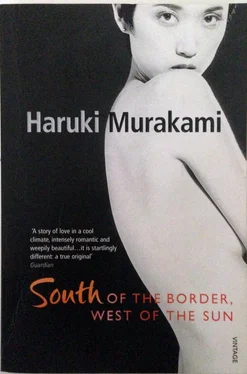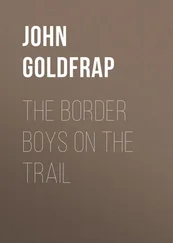“Hmm….,” I said.
“Do your mother and father get along all right?”
I couldn’t answer right away. I’d never thought about it before.
“My mother isn’t too strong physically,” I said. “I’m not sure, but it was probably too much of a strain for her to have another child after me.”
“Have you ever wondered what it would be like to have a brother or sister?”
“No.”
“Why not?”
I picked up the record jacket on the table. It was too dark to read what was written on it. I put the jacket down and rubbed my eyes a couple of times with my wrist. My mother had once asked me the same question. The answer I gave then didn’t make her happy or sad. It just puzzled her. But for me it was a totally honest, totally sincere answer.
The things I wanted to say got all jumbled up as I talked, and my explanation seemed to go on forever. But what I was trying to get across was just this: The me that’s here now has been brought up without any brothers or sisters. If I did have brothers or sisters I wouldn’t be the me I am. So it’s unnatural for the me that’s here before you to think about what it’d be like to have brothers or sisters…. In other words, I thought my mother’s question was pointless.
I gave the same answer to Shimamoto. She gazed at me steadily as I talked. Something about her expression pulled people in. It was as if–this is something I thought of only later, of course–she were gently peeling back one layer after another that covered a person’s heart, a very sensual feeling. Her lips changed ever so slightly with each change in her expression, and I could catch a glimpse deep within her eyes of a faint light, like a tiny candle flickering in the dark, narrow room.
“I think I understand what you mean,” she said in a mature, quiet voice.
“Really?”
“Um,” she answered. “There are some things in this world that can be done over, and some that can’t And time passing is one thing that can’t be redone. Come this far, and you can’t go back. Don’t you think so?”
I nodded.
“After a certain length of time has passed, things harden up. Like cement hardening in a bucket. And we can’t go back anymore. What you want to say is that the cement that makes you up has hardened, so the you you are now can’t be anyone else.”
“I guess that’s what I mean,” I said uncertainly.
Shimamoto looked at her hands for a time.
“Sometimes, you know, I start thinking. About after I grow up and get married. I think about what kind of house I’ll live in, what I’ll do. And I think about how many children I’ll have.”
“Wow,” I said.
“Haven’t you ever thought about that?”
I shook my head. How could a twelve-year-old boy be expected to think about that? “So how many kids do you want to have?”
Her hand, which up till then had laid on the back of the sofa, she now placed on her knee. I stared vacantly at her fingers tracing the plaid pattern of her skirt There was something mysterious about it, as if invisible thread emanating from her fingertips spun together an entirely new concept of time. I closed my eyes, and in the darkness, whirlpools flashed before me. Countless whirlpools were born and disappeared without a sound. Off in the distance, Nat King Cole was singing “South of the Border.” The song was about Mexico, but at the time I had no idea. The words “south of the border” had a strangely appealing ring to them. I was convinced something utterly wonderful lay south of the border. When I opened my eyes, Shimamoto was still moving her fingers along her skirt. Somewhere deep inside my body I felt an exquisitely sweet ache.
“It’s strange,” she said, “but when I think about children, I can only imagine having one. I can somehow picture myself having children. I’m a mother, and I have a child. I have no problem with that. But I can’t picture that child having any brothers or sisters. It’s an only child.”
She was, without a doubt, a precocious girl. I feel sure she was attracted to me as a member of the opposite sex—a feeling I reciprocated. But I had no idea how to deal with those feelings. Shimamoto didn’t, either, I suspect. We held hands just once. She was leading me somewhere and grabbed my hand as if to say, This way—hurry up. Our hands were clasped together ten seconds at most, but to me it felt more like thirty minutes. When she let go of my hand, I was suddenly lost. It was all very natural, the way she took my hand, but I knew she’d been dying to do so.
The feel of her hand has never left me. It was different from any other hand I’d ever held, different from any touch I’ve ever known. It was merely the small, warm hand of a twelve-year-old girl, yet those five fingers and that palm were like a display case crammed full of everything I wanted to know—and everything I had to know. By taking my hand, she showed me what these things were. That within the real world, a place like this existed. In the space of those ten seconds I became a tiny bird, fluttering into the air, the wind rushing by. From high in the sky I could see a scene far away. It was so far off I couldn’t make it out clearly, yet something was there, and I knew that someday I would travel to that place. This revelation made me catch my breath and made my chest tremble.
I returned home, and sitting at my desk, I gazed for a long time at the fingers Shimamoto had clasped. I was ecstatic that she’d held my hand. Her gentle touch warmed my heart for days. At the same time it confused me, made me perplexed, even sad in a way. How could I possibly come to terms with that warmth?
After graduating from elementary school, Shimamoto and I went on to separate junior highs. I left the home I had lived in till then and moved to a new town. I say a new town, but it was only two train stops from where I grew up, and in the first three months after I moved I went to see her three or four times. But that was it. Finally I stopped going. We were both at a delicate age, when the mere fact that we were attending different schools and living two train stops away was all it took for me to feel our worlds had changed completely. Our friends were different, so were our uniforms and textbooks. My body, my voice, my way of thinking, were undergoing sudden changes, and an unexpected awkwardness threatened the intimate world we had created. Shimamoto, of course, was going through even greater physical and psychological changes. And all of this made me uncomfortable. Her mother began to look at me in a strange way. Why does this boy keep coming over? she seemed to be saying. He no longer lives in the neighborhood, and he goes to a different school . Maybe I was just being too sensitive.
Shimamoto and I thus grew apart, and I ended up not seeing her anymore. And that was probably ( probably is the only word I can think of to use here; I don’t consider it my job to investigate the expanse of memory called the past and judge what is correct and what isn’t) a mistake. I should have stayed as close as I could to her. I needed her, and she needed me. But my self-consciousness was too strong, and I was too afraid of being hurt. I never saw her again. Until many years later, that is.
Even after we stopped seeing each other, I thought of her with great fondness. Memories of her encouraged me, soothed me, as I passed through the confusion and pain of adolescence. For a long time, she held a special place in my heart. I kept this special place just for her, like a Reserved sign on a quiet corner table in a restaurant. Despite the fact that I was sure I’d never see her again.
When I knew her I was still twelve years old, without any real sexual feelings or desire. Though I’ll admit to a vaguely formed interest in the swell of her chest and what lay beneath her skirt. But I had no idea what this meant, or where it might lead.
Читать дальше












